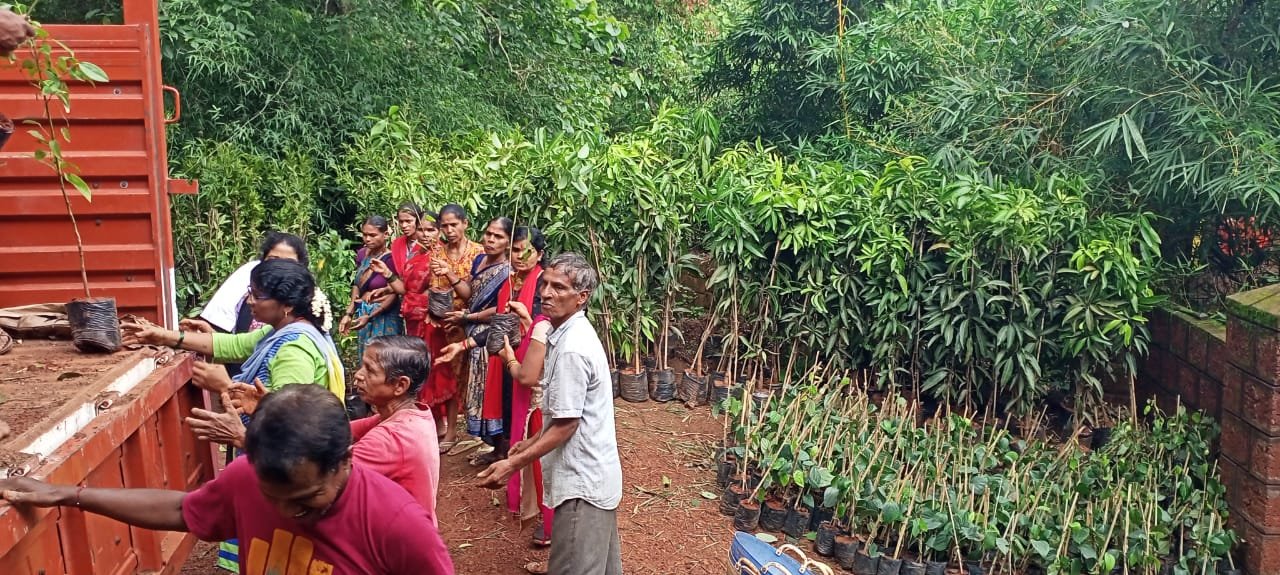
Raju is literally 'business nomad'. He is ready to shift his business premises any time if any one objects, because his business is conducted in open only with a single important equipment-a weighing balance. And there are other places inthe city where a small payment to police would suffice to continue the business until some one notices him again. Most of the time he is 'conspicuous by his invisibility'! That is because of nature of his business. Heaps of waste amidst which he sits is camaouflaged by the typical crowded, dusty and busy Indian streets in the cities.
His business model is simple. He gets one Indian rupee (about 2 USA cents) per kg of scrap steel or paper that he collects by paying to one who provides the waste and selling to the one who takes it for the recycling. For glass and plastics it is half or less for each Kg. He aims for about Indian Rupees –INR- 300-400 (USD 6 to 8) per day but at times it can be as low as INR 80 per day. If you consider the definition of 'Poverty Line' as per Planning Commission of India which is INR 28.65 per capita in cities and INR22.42 in rural areas, Rajuis a 'rich guy'. Sadly, he has no shelter of his own and his business place is on the roads, lanes and by-lanes. But, surprisingly he does have hisvery own business and operational strategies.
He starts his business early in the morning, and focuses on the remote area around which he has no competitors. I live in such place, up the hill and away from the city. I see him regularly. One of those days I asked him, what he is doing to increase his earning. In today's management terms it was like asking a CEO, 'what is your business projections and vision over next few years?'
'I want to recruit more boys whom I will deploy to cover more houses in suburbs which are fast expanding and if I myself shift my focus in the cities which now have growing tendencies to throw away more and more, my business will grow', said Raju. I was quite surprised. In today's managements terms he was focusing on expansion, volume and geographical market fragmentation and not on 'price structures' or not even' resource efficiency'! After all Raju was a CEO with ground realities.
In 2011 UNEP produced a report titled Towards a Green Economy. It described an economy that results in improved human well-being as well as social equity, while significantly reducing environmental risks and ecological scarcities. The report provides number of cases like that of General Motors who saved millions of dollars through resource efficiencies. I read a report early 2013 that General Motors saved whooping USD 1 billion by recycling.
It is claimed that GM through recycling and other innovative activities (it made bird nests with the discarded battery covers!) GM generated a total of $2.5 billion in revenue between 2007 and 2010. The company stated that it wants to do more but there are barriers like adequate infrastructure in other parts of the world where GM operates to support recycling. Had planned a meeting with a group of automakers, suppliers, waste management companies and government officials in USA to promote more recycling.
"By connecting local recyclers – and those with potential – with area companies, we can start to address the gaps and build a more robust infrastructure that will help the auto industry and beyond to leave a smaller footprint", stated top official of GM.
Raju, who is busy in collecting scrap steel including discarded auto parts, probably produced in the shops of General Motors whose cars are sold in India, is unaware of Green Economy definition of UNEP and billions made by GM. And General Motors is equally unaware of Raju's efforts to make their business more resource efficient.
But I am sure, UNEP, one day will be aware of such 'Green Entrepreneurships' and report the case study of Rajubhangarwallain their next report. And hope that General Motors one day would hold a meeting of the 'bhangarwallas' in India to ensure that adequate infrastructure with trained supply chain for the recycling economy is built. The enthusiasm and zeal of Rajus of the world would make billions more for the GMs of the business.
Every small action, multiplied by billions, creates a wave of change. Let us remember that we are not separate from nature; we are an intrinsic part of it. The health of our planet is directly linked to our own well-being and the future of all species. By nurturing our environment, we are, in essence, nurturing ourselves and ensuring a vibrant, thriving home for generations to come. Let's act now, with purpose and passion, to safeguard the beauty and balance of our shared world.


TERRE Policy Centre organized a tree distribution drive in Dandeli, Karnataka, where they distribute...